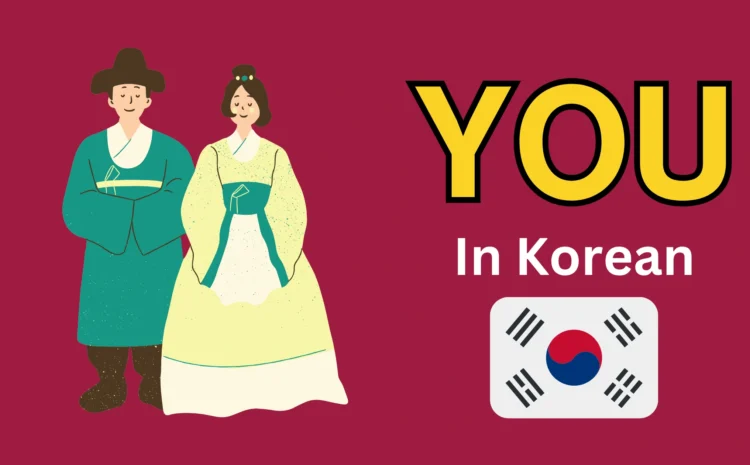“You” in Korean: How to Use It Formally and Informally

Wondering how to say “you” in Korean? The primary terms are 너 (neo) for informal settings and 당신 (dangsin) for formal contexts.
Keep in mind, though, that these terms don’t function exactly like “you” in English. 너 (neo) is frequently used in casual, everyday conversations, whereas 당신 (dangsin) is rarely used in regular dialogue and can come across as confrontational or overly intimate. We’ll dive deeper into this below.
Is There a Korean Word for “You”?
Yes, there is. The informal term for “you” is 너 (neo), while the formal term is 당신 (dangsin). However, 당신 (dangsin) is less frequently used than 너 (neo). There are also other terms that mean “you,” such as 그대 (geudae) and 자네 (jane).
How to Say “You” in Korean
In Korean, the term for “you” varies depending on the level of formality or familiarity in the situation. 너 (neo) is used in informal contexts, whereas 당신 (dangsin) is more formal and less commonly used in everyday speech, often appearing in written language or between married couples.
In polite conversation, Koreans often prefer using the person’s name or title instead of directly using “you.”
Different Ways to Say “You” in Korean
Understanding the different ways to say “you” in Korean is crucial for polite communication. Here’s a guide to the common terms and their appropriate usage:
- 너 (neo): This informal “you” is used with close friends or those younger than you. It’s not suitable for formal or professional contexts as it might come across as disrespectful.
Example:
When asking a friend what they’re doing:
너 지금 뭐해? (neo jigeum mwohae?)
What are you doing now? - 당신 (dangsin): The formal counterpart to 너 (neo), 당신 (dangsin) is rarely used in casual conversation. It’s more common in written language, songs, or poetry and can sound intimate or confrontational. It is sometimes used between spouses, particularly older couples, but should be used with caution in direct conversations.
Examples:
A husband to his wife:
당신이 내 아내라서 정말 행복해. (dangsini nae anaeraseo jeongmal hangbokhae.)
I’m so happy that you’re my wife.
In a heated argument:
당신 때문에 일이 이렇게 됐어요! (dangsin ttaemune iri ireoke dwaesseoyo!)
Because of you, things turned out like this!
In these examples, 당신 (dangsin) conveys different emotions based on the context—affection when intimate, and blame or dissatisfaction when confrontational.
- 그대 (geudae): A poetic form of “you” often found in songs, poetry, or romantic language, though rarely used in everyday conversation.
Example:
In a song:
그대는 나의 모든 것 (geudaeneun naui modeun geot)
You are my everything. - 선생님 (seonsaengnim): A respectful title used for teachers or other respected professionals. It serves as an indirect “you” in formal interactions and is often used beyond educational settings.
Examples:
To a teacher:
선생님께 드리는 선물이에요. (seonsaengnimkke deurineun seonmurieyo)
It’s a gift for you.
Expressing gratitude:
선생님 덕분에 잘 지냈습니다. (seonsaengnim deokbune jal jinaetseumnida.)
Thanks to you, I have been well. - 자기 (jagi): An affectionate term similar to “honey” or “babe.” It is used exclusively in intimate contexts and not suitable for formal or general use.
Example:
Between partners:
자기, 뭐 먹고 싶어? (jagi, mwo meokgo sipeo?)
Honey, what do you want to eat? - 그쪽 (geujjok): A more polite term than 너 (neo) but less formal than titles or honorifics. It is used to maintain politeness while keeping some distance, suitable for interactions with acquaintances or strangers.
Examples:
To a stranger in a crowded subway:
그쪽 먼저 가세요. (geujjok meonjeo gaseyo.)
You go first.In a meeting with someone you don’t know well:
그쪽은 어떻게 생각해요? (geujjogeun eotteoke saenggakaeyo?)
What do you think?

